Four dead in New Caledonia riots, France to declare state of emergency
Kirsty Needham and Juliette Jabkhiro
Updated Wed, May 15, 2024
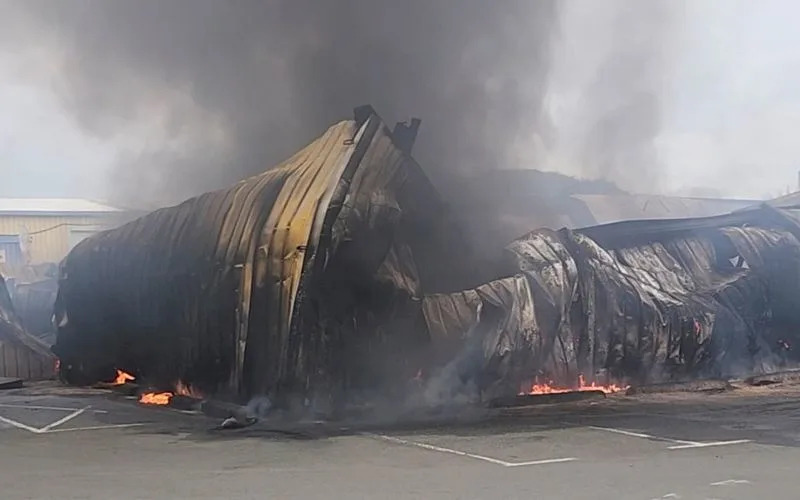
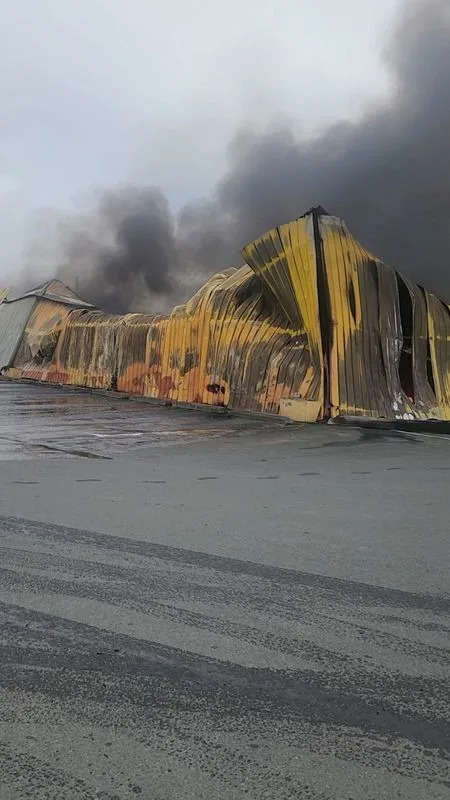
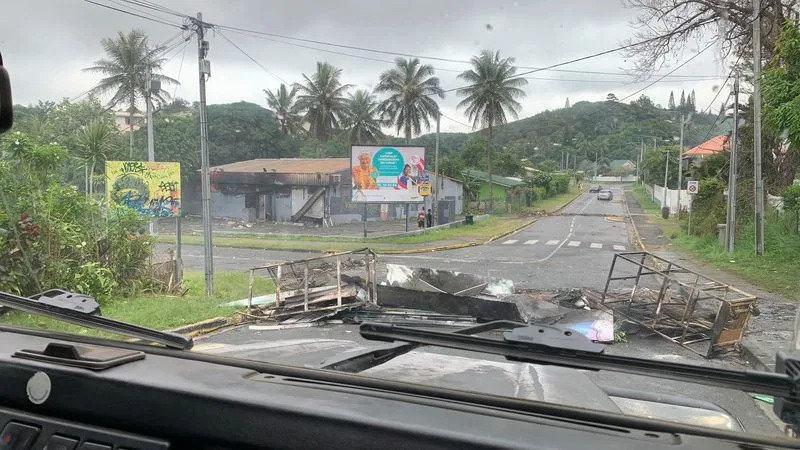
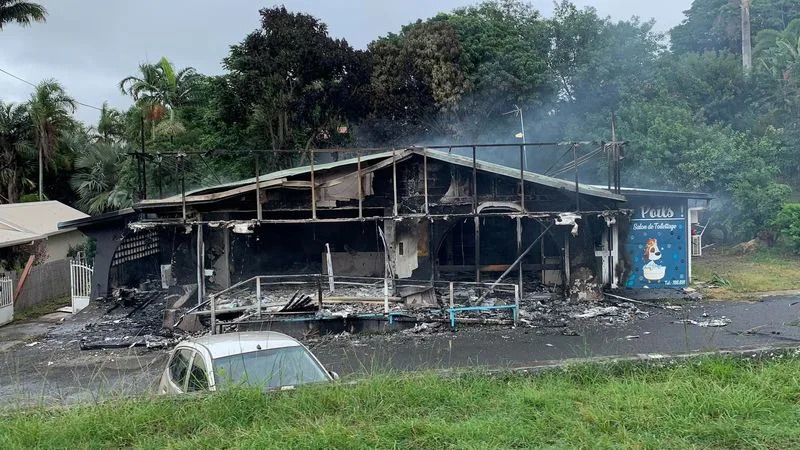
Damage caused by rioters in New Caledonia
SYDNEY/PARIS (Reuters) -France will declare a state of emergency on the Pacific island of New Caledonia on Wednesday after three young indigenous Kanak and a police official were killed in riots over electoral reform.
The state of emergency will give authorities additional powers to ban gatherings and forbid people from moving around the French-ruled island.
Police reinforcements have been sent to the island after rioters torched vehicles and businesses and looted stores. Schools have been shut and there is already a curfew in the capital.
"Since the start of the week, New Caledonia has been hit by violence of a rare intensity," said Prime Minister Gabriel Attal.
"No violence will be tolerated," he said, adding that the state of emergency "will allow us to roll out massive means to restore order."
Earlier in the day, a spokesman for New Caledonia's President Louis Mapou said that three young indigenous Kanak had died in the riots. The French government later announced that a police official had died from a gunshot wound.
Rioting broke out over a new bill, adopted by lawmakers in Paris on Tuesday, that will allow French residents who have lived in New Caledonia for 10 years to vote in provincial elections - a move some local leaders fear will dilute the Kanak vote.
"Residents are terrorised, armed and organising themselves to make the rounds tonight and protect their homes," said Lilou Garrido Navarro Kherachi, 19, who drove around protester blockades on Wednesday morning in the island's capital Noumea.
She said she heard gunfire and saw burning cars and buildings, including a ruined veterinary clinic where neighbours had evacuated the animals before the fire spread.
Police were outnumbered by protesters, she told Reuters.
Electoral reform is the latest flashpoint in a decades-long tussle over France's role in the mineral-rich island, which lies in the southwest Pacific, some 1,500 km (930 miles) east of Australia.
France annexed the island in 1853 and gave the colony the status of overseas territory in 1946. It has long been rocked by pro-independence movements.
LOOTING
New Caledonia is the world's No. 3 nickel miner and residents have been hit by a crisis in the sector, with one in five living under the poverty threshold.
"Politicians have a huge share of responsibility," said 30-year-old Henri, who works in a hotel in Noumea. "Loyalist politicians, who are descendents of colonialists, say colonisation is over, but Kanak politicians don't agree. There are huge economic disparities," he said.
Henri, who declined to give his full name, said there was significant looting amid the riots, with the situation most dangerous at night.
The French government has said the change in voting rules was needed so elections would be democratic.
But it said it would not rush calling a special congress of the two houses of parliament to rubber-stamp the bill and has invited pro- and anti-independence camps for talks in Paris on the future of the island, opening the door to a potential suspension of the bill.
The major pro-independence political group, Front de Liberation Nationale Kanak et Socialiste (FLNKS), which condemned the violence, said it would accept Macron's offer of dialogue and was willing to work towards an agreement "that would allow New Caledonia to follow its path toward emancipation".
Most residents were staying indoors. With stores closed, breastfeeding mothers were organising to share milk with mothers who have none left to feed their babies, said witness Garrido Navarro Kherachi.
She said she moved to New Caledonia when she was eight years old, and has never been back to France. Although eligible to vote under the new rules, she says she won't "out of respect for the Kanak people".
"That would give me the right to vote but I don't feel I know enough about the history of Caledonia and the struggle of the Kanak people to allow me to vote," she said.
(Reporting by Kirsty Needham in Sydney and Dominique Vidalon, Elizabeth Pineau, Michel Rose, Augustin Turpin, Juliette Jabkhiro and Camille Raynaud in Paris; writing by Kirsty Needham and Ingrid Melander; Editing by Sonali Paul, Ros Russell and Christina Fincher)
France declares state of emergency in New Caledonia after deadly riots
RFI
Wed, May 15, 2024

French President Emmanuel Macron on Wednesday declared a state of emergency in New Caledonia after four people – including a gendarme – were killed in riots that broke out over controversial changes to voting rules.
Hundreds of people have been injured in the worst unrest the Pacific island has seen since the 1980s, with schools and shops shuttered as police reinforcements were sent in.
French authorities say more than 130 people have been arrested since protests turned violent on Monday.
Shops were looted and vehicles set on fire, prompting authorities to ban public gatherings and close the main airport. A night-time curfew has been extended to Thursday.
The Interior Ministry said 500 security forces would be deployed to support the 1,800 police and gendarmes already in the French overseas territory.
“All violence is intolerable and will be the subject of a relentless response to ensure the return of order," the Elysée's website said.
Those killed were young indigenous Kanak people, a spokesperson for New Caleonian leader Louis Mapou said, as well as a gendarme who was shot in Plum, a south-western coastal village.
New Caledonia has witnessed decades of tensions between indigenous Kanaks seeking independence from France, and the descendants of colonisers who want to remain French.
This week's violence came after the National Assembly on Tuesday approved a constitutional reform that would increase the number of people eligible to participate in elections.
Why this French island in the Pacific is being roiled by violence over a vote held 10,000 miles away
Angus Watson and Helen Regan, CNN
Wed, May 15, 2024
Deadly violence on the French island of New Caledonia erupted for a third day Wednesday, with armed clashes between protesters, militias and police, and buildings and cars set on fire in the capital of the South Pacific archipelago.
At least four people have died in the unrest, which is considered the worst since the 1980s, and prompted authorities to impose a curfew in the capital Noumea. It has also banned public gatherings, carrying weapons and selling alcohol, and closed the main airport — usually a busy tourist hub — to commercial traffic.
The violence is the latest outburst of political tensions that have simmered for years and pitted the island’s largely pro-independence indigenous Kanak communities — who have long chafed against rule by Paris – against French inhabitants opposed to breaking ties with their motherland.
France’s military has mobilized and flown in “four additional squadrons to restore order,” according to French Interior Minister Gerald Darmanin.
Lying in the South Pacific with Australia, Fiji and Vanuatu for neighbors, New Caledonia is a semiautonomous French territory — one of a dozen scattered throughout the Pacific, Caribbean and Indian Ocean.
Protests began Monday involving mostly young people, in response to the tabling of a vote 10,000 miles (17,000 kilometers) away in the French parliament proposing changes to New Caledonia’s constitution that would give greater voting rights to French residents living on the islands.
On Tuesday, legislators voted overwhelmingly in favor of the change.
The move would add thousands of extra voters to New Caledonia’s electoral rolls, which have not been updated since the late 1990s. Pro-independence groups say the changes are an attempt by France to consolidate its rule over the archipelago.
“The last two days we’ve seen violence of a scale we haven’t seen for 30 years in New Caledonia,” Denise Fisher, a former Australian Consul-General in New Caledonia, told CNN. “It is kind of marking the end of 30 years of peace.”
“The Kanak people are objecting to [the vote in France] not just because it’s been decided in Paris without them but also they feel that they want it to be part of a negotiation … which would include another self determination vote and a range of other things.”
French President Emmanuel Macron called for calm, issuing a letter Wednesday to New Caledonian political leaders urging them to “unambiguously condemn all this violence” and inviting both pro- and anti-independence leaders to meet him “face to face” in Paris.
Macron will chair a defense and national security council on Wednesday, focusing on the violence, the presidential palace said.
Macron’s administration has pushed for a pivot to the Indo-Pacific, stressing that France is a Pacific power, as China and the United States beef up their presence amid a battle for influence in the strategically important region. New Caledonia is at the center of that plan.
“The stakes are high for France,” Fisher added. “France has identified an entire Indo-Pacific vision for itself.”
“The legitimacy of France’s participation this way, having an influence in this way, is in question when you have scenes like this.”
The violence
Three people - two men and a woman, all indigenous Kanaks - have been shot dead in the violent protests and looting, according to Charles Wea, spokesperson for Louis Mapou, President of the Government of New Caledonia. A French police officer who was injured by gunfire in the riots also died, French interior minister Gérald Darmanin said.
Demonstrators have also set fire to buildings and cars in Noumea, defying a curfew that has been extended to Thursday.
Thick plumes of black smoke covered the capital on Wednesday morning, social media video showed. Images showed burned-out cars, fires in the street, and shops vandalized and looted.
“Some are equipped with hunting rifles with buckshot as ammunition. Others were equipped with larger rifles, firing bullets,” the French High commissioner to New Caledonia Louis Le Franc said.
More than 140 people have been arrested, while at least 60 security personnel have been injured in the clashes between local nationalist groups and the French authorities, according to Le Franc.
One Noumea resident told CNN affiliate Radio New Zealand of panic buying reminiscent of Covid-19. “A lot of fire, violence…but it’s better I stay safe at home. There are a lot of police and army. I want the government to put the action for the peace,” the person told RNZ, asking to remain anonymous.
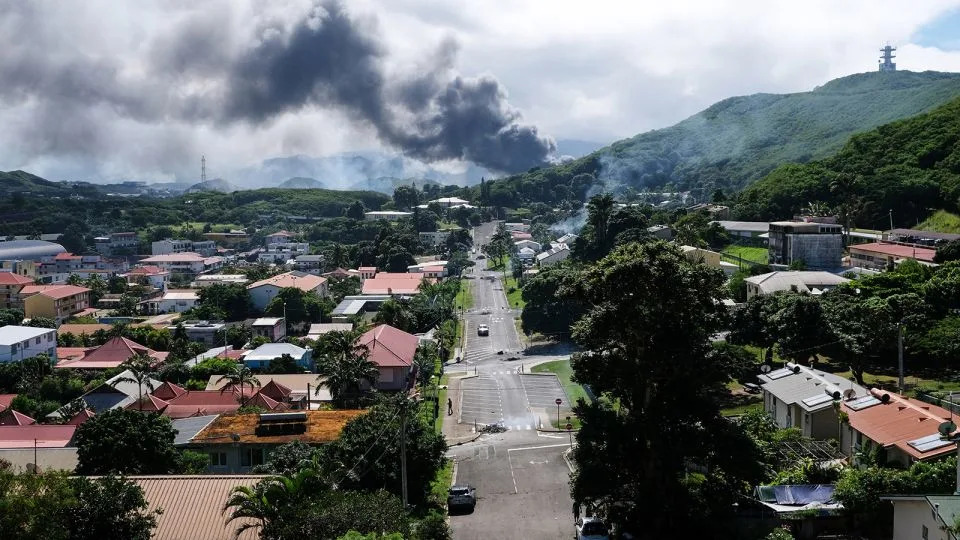
Smoke rises in the distance in Noumea, New Caledonia on May 14, 2024. - Theo Rouby/AFP/Getty Images
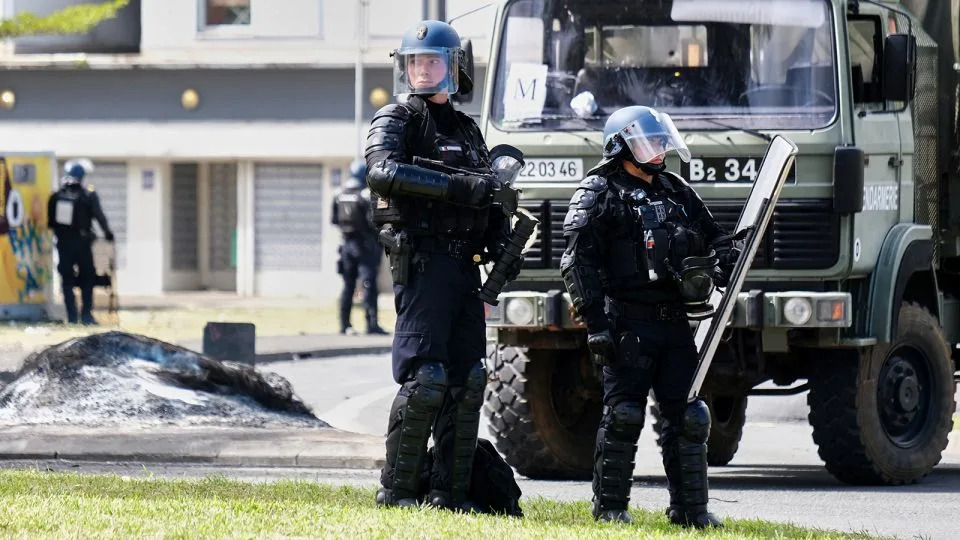
French gendarme officers guard the entrance of the Vallee-du-Tir district, in Noumea, New Caledonia on May 14, 2024. - Theo Rouby/AFP/Getty Images
The vote
Colonial France took control of New Caledonia in 1853. White settlement followed and the indigenous Kanak people were longtime victims of harsh segregation policies. Many indigenous inhabitants continue to live with high rates of poverty and high unemployment to this day.
Deadly violence exploded in the 1980s eventually paving the way towards the Noumea Accord in 1998, a promise by France to give greater political autonomy to the Kanak community.
Multiple referendums were held in recent years - in 2018, 2020 and 2021 - as part of the agreement offering voters in New Caledonia the option to secede from France. Each referendum was voted down, but the process was marred by boycotts from pro-independence groups and by Covid-19.
Voter roles have been frozen since the Noumea Accord, the issue that France’s parliament was seeking to address in the vote that sparked this week’s violence.
French lawmakers in Paris voted 351 – 153 in favor of changing the constitution to “unfreeze” the territory’s electoral rolls, enfranchising French residents who have been in New Caledonia for 10 years.
The lists were frozen by the French government to appease pro-independence Kanak nationalists who believe new arrivals to the former colony, including from France, dilute popular support for independence.
Both houses of France’s parliament need to approve the constitutional change passed by the National Assembly.
On Tuesday, French Prime Minister Gabriel Attal said the government would not call a meeting of the parliament to vote on the motion before talks with Kanak leaders, including major independence alliance the Kanak and Socialist National Liberation Front (FLNKS).
“I invite New Caledonia’s political leaders to seize this opportunity and come to Paris for talks in the coming weeks. The important thing is conciliation. Dialogue is important. It is about finding a common, political and global solution,” Attal said on the floor of the National Assembly.
FLNKS issued its own statement Wednesday both condemning the vote at the National Assembly and calling for an end to the violence.
“FLNKS appeals to the youth involved in these demonstrations for appeasement and to ensure the safety of the population and property,” the statement read.
State of emergency set for France's New Caledonia after deadly riots
Mathurin DEREL
Wed, May 15, 2024
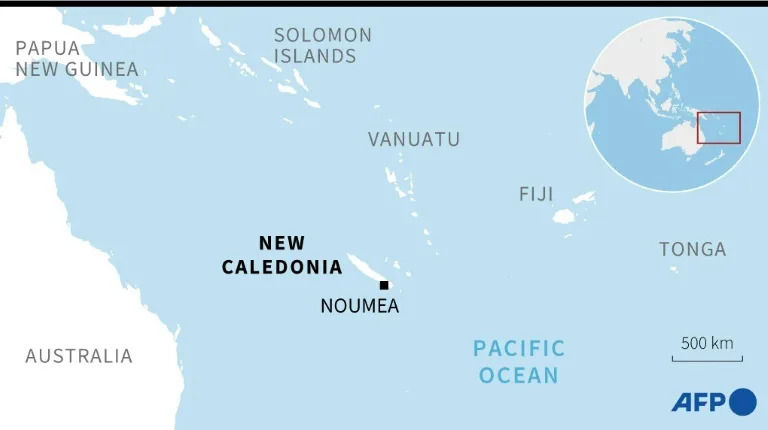
Map of New Caledonia in the Pacific Ocean. (STAFF)
President Emmanuel Macron moved Wednesday to declare a state of emergency in France's Pacific territory of New Caledonia after a second night of rioting that left four dead, including a gendarme, and hundreds wounded.
Anger over constitutional reforms from Paris boiled over again after the lower house of parliament overnight backed a hotly-disputed voting reform that the representatives of the indigenous Kanak population say weighs against them.
Despite heavily armed security forces fanning out across the capital Noumea, and the ordering of a nighttime curfew, rioting continued overnight virtually unabated in the worst violence there since the 1980s.
New Caledonia, which lies between Australia and Fiji, is one of several French territories spanning the globe from the Caribbean and Indian Ocean to the Pacific that remain part of France in the post-colonial era.
Colonised by France from the second half of the nineteen century, it already has special status within France unlike other overseas territories.
While it has on three occasions rejected independence in referendums, independence retains support particularly among the indigenous Kanak people.
Macron warned that any further violence would be met with an "unyielding" response and called for a resumption of political dialogue to end the unrest, the Elysee said in a statement.
"The president has requested that the decree aimed at declaring a state of emergency in New Caledonia be included on the agenda" of a cabinet meeting this afternoon, the presidency said.
- Looting and fires -
Shops were looted and public buildings torched during overnight violence, the authorities there said.
Hundreds of people including around 100 police and gendarmes have been injured in the unrest, French Interior Minister Gerald Darmanin said in Paris.
The presidency said three people had been killed, while a gendarme has been very seriously wounded. The gendarme -- based outside Paris -- later died of his wounds, the national gendarmerie said.
Macron cancelled a planned domestic trip and moved Wednesday's regular cabinet meeting to hold a crisis meeting with key ministers on New Caledonia earlier on Wednesday.
In Noumea and the commune of Paita there were reports of several exchanges of fire between civil defence groups and rioters.
Streets in the capital were pocked with the shells of burned-out cars and buildings, including a sports store and a large concrete climbing wall.
"Numerous arsons and pillaging of shops, infrastructure and public buildings -- including primary and secondary schools -- were carried out," said the High Commission, which represents the French central government in New Caledonia.
- 'Calm and reason' -
Security forces had managed to regain control of Noumea's prison, which holds about 50 inmates, after an uprising and escape bid by prisoners, it said in a statement.
Police have arrested more than 130 people since the riots broke out Monday night, with dozens placed in detention to face court hearings, the commission said.
A nighttime curfew was extended, along with bans on gatherings, the carrying of weapons and the sale of alcohol.
The territory's La Tontouta International Airport remained closed to commercial flights.
As rioters took to the streets, France's lower house of parliament 17,000 kilometres (10,600 miles) away voted in favour of a constitutional change bitterly opposed by indigenous Kanaks.
The reform -- which must still be approved by a joint sitting of both houses of the French parliament -- would give a vote to people who have lived in New Caledonia for 10 years.
Pro-independence forces say that would dilute the share of the vote held by Kanaks, the Indigenous group that makes up about 41 percent of the population and the major force in the pro-independence movement.
But those in favour of the reform argue voter lists have not been updated since 1998 -- depriving island residents who arrived from mainland France or elsewhere since then of a vote in provincial polls.
Macron has said French lawmakers would vote to definitively adopt the constitutional change by the end of June unless New Caledonia's opposing sides agree on a new text that "takes into account the progress made and everyone's aspirations".
After he urged local representatives to soothe tensions, major pro- and anti-independence parties issued a joint statement Wednesday calling for "calm and reason" to return to the archipelago, adding that "we are destined to keep living together".
burs-jh-sjw/jm
New Caledonia police patrol streets with burnt cars
VIDEO TRANSCRIPT
Reuters
Updated Tue, May 14, 2024
STORY: :: New Caledonia police patrol streets with burnt cars
after protesters blocked key roads
::May 13, 2024
:: Noumea, New Caledonia
:: The international airport is shut and a curfew is in place,
according to the French High Commission
::Thio, New Caledonia
:: Protesters fear the proposed changes to the
constitution may dilute the vote of indigenous Kanak
New Caledonia's government called for calm and condemned the destruction of property. Video showed police patrolling the streets among burnt-out cars and plumes of smoke, after protesters had set up blockades on key roads on Monday (May 13).
The protests and violence happened on Monday ahead of debate on Tuesday in the French National Assembly on changes to the New Caledonian constitution. The proposed changes would allow more French residents to vote in New Caledonia elections, which independence supporters fear will dilute the vote of indigenous Kanak.
The French High Commission said in a statement that significant disturbances in the capital, Noumea, and surrounding townships were ongoing, and numerous buildings including shops, pharmacies and car dealerships were damaged. So far 36 people had been arrested.
France sends more police, seeks talks, to quell New Caledonia riots
Reuters
Updated Tue, May 14, 2024
STORY: :: New Caledonia police patrol streets with burnt cars
after protesters blocked key roads
::May 13, 2024
:: Noumea, New Caledonia
:: The international airport is shut and a curfew is in place,
according to the French High Commission
::Thio, New Caledonia
:: Protesters fear the proposed changes to the
constitution may dilute the vote of indigenous Kanak
New Caledonia's government called for calm and condemned the destruction of property. Video showed police patrolling the streets among burnt-out cars and plumes of smoke, after protesters had set up blockades on key roads on Monday (May 13).
The protests and violence happened on Monday ahead of debate on Tuesday in the French National Assembly on changes to the New Caledonian constitution. The proposed changes would allow more French residents to vote in New Caledonia elections, which independence supporters fear will dilute the vote of indigenous Kanak.
The French High Commission said in a statement that significant disturbances in the capital, Noumea, and surrounding townships were ongoing, and numerous buildings including shops, pharmacies and car dealerships were damaged. So far 36 people had been arrested.
France sends more police, seeks talks, to quell New Caledonia riots
Updated Tue, May 14, 2024
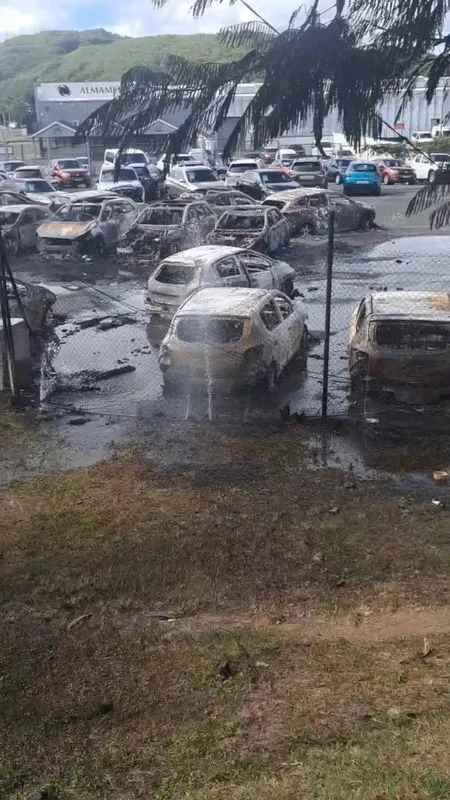
France sends more police, seeks talks, to quell New Caledonia riots
By Kirsty Needham and Juliette Jabkhiro
WELLINGTON/PARIS (Reuters) - France sent extra police squadrons to quell riots on the Pacific island of New Caledonia on Tuesday but also opened the door to a negotiated settlement with pro- and anti-independence groups.
Overnight, rioters burnt cars, dozens of businesses, clashed with police and set up barricades to protest against plans to allow more people to take part in local elections in the French-ruled territory, which indigenous Kanak protesters reject.
The proposed changes, which the National Assembly in Paris will vote on later on Tuesday, would allow French residents who have lived in New Caledonia for 10 years to vote in provincial elections - a move local leaders fear will dilute the Kanak vote but the government says is needed so elections are democratic.
"The streets were on fire, they were rioting in the streets, quite a frightening experience actually," New Zealand tourist Mike Lightfoot told TVNZ television.
Despite a curfew, violence continued on Tuesday evening on the island, situated some 20,000 km (12,427 miles) from mainland France, local broadcaster NC La 1ere reported.
The island's capital Noumea was covered by a cloud of black smoke, NC La 1ere said, adding that a local sport facility had been set ablaze. It also reported a riot in a prison.
One of five island territories spanning the Indo-Pacific held by France, New Caledonia is the word's third-largest nickel producer and is the centrepiece of French President Emmanuel Macron's plan to increase Paris's influence in the Pacific.
Prime Minister Gabriel Attal said the vote should proceed in the afternoon as planned, but confirmed that Macron would not rush into convening a special congress of the two houses of parliament required to rubber-stamp the bill.
Instead, he would invite representatives of the territory's population - both pro- and anti-independence - to Paris for talks on the future status of New Caledonia, after decades of tensions over France's role.
"It's through talking, and only through talking, that we can find a solution," Attal told lawmakers. "All we want is to find an overall political agreement, with those in favour of and against independence."
He did not spell out what such a deal could cover.
VIOLENCE
At a rally in Paris, pro-independence protesters said the bill should be withdrawn.
"If there is violence today (in New Caledonia), it's in response to the violence we've suffered from since colonisation," Kanak youth leader Daniel Wea, 43, told Reuters, saying the planned electoral changes would leave the Kanaks isolated on their island.
"We're here to show ... we will fight until we get what we want: independence," said 24-year-old Wendy Gowe, whose grand-fathers died when violence flared up on the island in the 1980s.
New Caledonia is situated 1,500 km (930 miles) east of Australia, with a population of 270,000 including 41% Melanesian and 24% of European origin, mostly French.
A 1998 Noumea Accord helped end a decade of conflict by outlining a path to gradual autonomy and restricting voting to the indigenous Kanak as well as people who arrived in New Caledonia before 1998.
The accord allowed for three referendums to determine the future of the country. In all three, independence was rejected, but that did not end the debate over the island's status or France's role.
Meanwhile, French miner Eramet said its local unit SLN had raised its security level amid the unrest and that its plant was running at minimum capacity.
"Our mines are halted, just like the vast majority of mines in New Caledonia," a spokesperson told Reuters.
Nickel miner Prony Resources said it activated a crisis unit to "maintain our industrial facilities and prevent any damage to our assets".
The French government has been negotiating a rescue package for the loss-making New Caledonian nickel sector, including a commitment to supply Europe's battery supply chain, but talks have stalled amid current political tensions.
(Reporting by Lucy Craymer and Kirsty Needham in Wellington, Dominique Vidalon, Tassilo Hummel, Gus Trompiz, Elizabeth Pineau, Juliette Jabkhiro in Paris; Writing by Ingrid Melander; Editing by Neil Fullick, Stephen Coates, Christina Fincher, William Maclean)
Curfew imposed in New Caledonia after violent protests against constitutional reform
RFI
Tue, May 14, 2024 at 12:03

The local government in New Caledonia has called for calm after violence broke out during protests to changes to the constitution being debated in the French National Assembly, which are denounced by supporters of independence for the overseas territory in the Pacific.
"All the reasons discontent, frustration and anger could not justify hurting or destroying what the country has been able to build for decades and compromising the future," the local government said in a statement Tuesday, after protests turned violent on Monday.
Violence broke out on the edge of a demonstration organised Monday by pro-independence supporters against changes to the constitution that would allow more French residents to vote in elections in New Caledonia, which independence supporters fear will dilute the vote of indigenous Kanak.
Several police officers were injured during clashes with protesters, the French High Commission said Tuesday, announcing a curfew in the capital, Noumea, on Tuesday night.
Buildings and businesses in Noumea and the surrounding areas were damaged and cars set on fire. Firefighters said they received nearly 1,500 calls Monday night and intervened in 200.
Pro- and anti-independence demos in New Caledonia split French island group
France mulls New Caledonia electoral reform ahead of key vote
‘High-calibre weapons’ fired in riots on French Pacific island
Our Foreign Staff
THE TELEGRAPH
Tue, May 14, 2024
Rioters fired “high-calibre weapons” at police during a night of violent unrest and looting on the island of New Caledonia, the French Pacific territory’s high commissioner has said.
High Commissioner of the Republic Louis Le Franc told reporters that “there have been no deaths” but “shots were fired at the gendarmes using high calibre weapons and hunting rifles”.
The unrest erupted on Monday in the French-run archipelago as protesters demonstrated against proposed voting reforms that have angered separatists.
At least two car dealerships and a bottling factory in Noumea were set on fire in arson attacks. Several supermarkets in the capital and neighbouring towns Dumbea and Mont-Dore were looted.
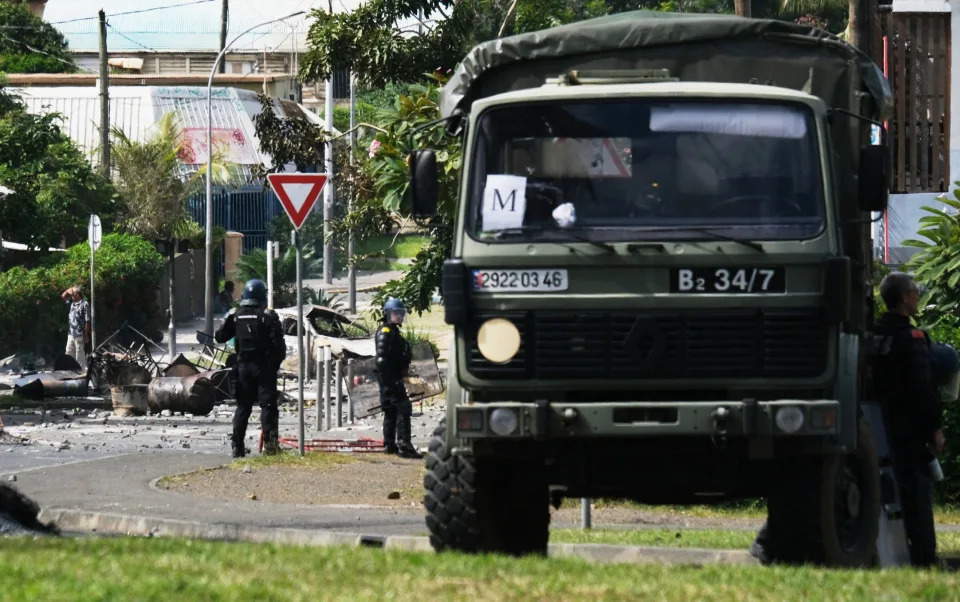
French gendarme officers on patrol in Noumea amid protests against a constitutional bill aimed at expanding the electorate for an upcoming election - THEO ROUBY/AFP
Sylvie, whose family has lived in New Caledonia for generations, said: “The police station nearby was on fire and a car was too, in front of my house. There was non-stop shouting and explosions, I felt like I was in a war. We are alone. Who is going to protect us?”
On Monday night groups of young masked or hooded demonstrators took over several roundabouts and confronted police, who responded with non-lethal rounds. Several vehicles were torched during violent clashes.
A total of 36 people were arrested and 30 police officers were injured, authorities confirmed. A night-time curfew, a ban on public gatherings, and a ban on alcohol sales are now in place until 6am on Wednesday.
Tue, May 14, 2024
Rioters fired “high-calibre weapons” at police during a night of violent unrest and looting on the island of New Caledonia, the French Pacific territory’s high commissioner has said.
High Commissioner of the Republic Louis Le Franc told reporters that “there have been no deaths” but “shots were fired at the gendarmes using high calibre weapons and hunting rifles”.
The unrest erupted on Monday in the French-run archipelago as protesters demonstrated against proposed voting reforms that have angered separatists.
At least two car dealerships and a bottling factory in Noumea were set on fire in arson attacks. Several supermarkets in the capital and neighbouring towns Dumbea and Mont-Dore were looted.

French gendarme officers on patrol in Noumea amid protests against a constitutional bill aimed at expanding the electorate for an upcoming election - THEO ROUBY/AFP
Sylvie, whose family has lived in New Caledonia for generations, said: “The police station nearby was on fire and a car was too, in front of my house. There was non-stop shouting and explosions, I felt like I was in a war. We are alone. Who is going to protect us?”
On Monday night groups of young masked or hooded demonstrators took over several roundabouts and confronted police, who responded with non-lethal rounds. Several vehicles were torched during violent clashes.
A total of 36 people were arrested and 30 police officers were injured, authorities confirmed. A night-time curfew, a ban on public gatherings, and a ban on alcohol sales are now in place until 6am on Wednesday.
Schools, colleges and the international airport are closed until further notice.
The high commission, the representative of the French state in New Caledonia, said: “Very intense public order disturbances took place last night [Monday] in Noumea and in neighbouring municipalities, and are still ongoing at this time.
The New Caledonia government appealed for “reason and calm” and called on “all Caledonians to demonstrate a sense of responsibility” while the commission said it was “massively mobilising internal security and civil security forces”.
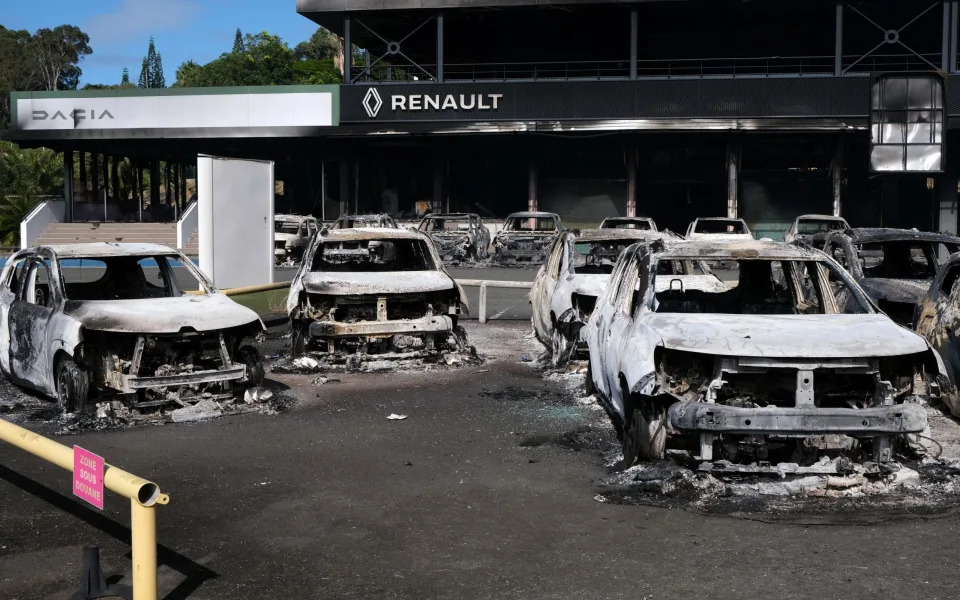
Cars at a Renault dealership in the Magenta district in Noumea were torched during the protests - AFP
The unrest comes as a constitutional reform is being debated in the national assembly in Paris. It aims to expand the electorate in the territory’s provincial elections.
France vowed in the Noumea Accord of 1998 to gradually give more political power to the Pacific island territory of nearly 300,000 people.
Under the agreement, New Caledonia has held three referendums over its ties with France, all rejecting independence.
The pro-independence Indigenous Kanaks rejected the result of the last referendum held in December 2021, which they boycotted due to the Covid-19 pandemic.

Smoke can be seen in the distance as a result of the riots in Noumea - AFP
The Noumea Accord has also meant that New Caledonia’s voter lists have not been updated since 1998 – meaning that island residents who have arrived from mainland France or elsewhere anytime in the past 25 years do not have the right to take part in provincial polls.
The French government has branded the exclusion of one out of five people from voting as “absurd”, while separatists fear that expanding voter lists would benefit pro-France politicians and “further minimise the Indigenous Kanak people”.
During a visit to the territory last year, Emmanuel Macron, the French president, said he wanted a revised constitutional status for New Caledonia to be in place by the beginning of 2024.
Mr Macron has been seeking to reassert his country’s importance in the Pacific region, where China and the United States are vying for influence but France has territories such as New Caledonia and French Polynesia.
BURN! FULL MOVIE
GREAT ANTI IMPERIALIST FILM
REVOLT IN AN 18TH CENTURY SUGAR COLONY IN THE CARIBBEAN
No comments:
Post a Comment